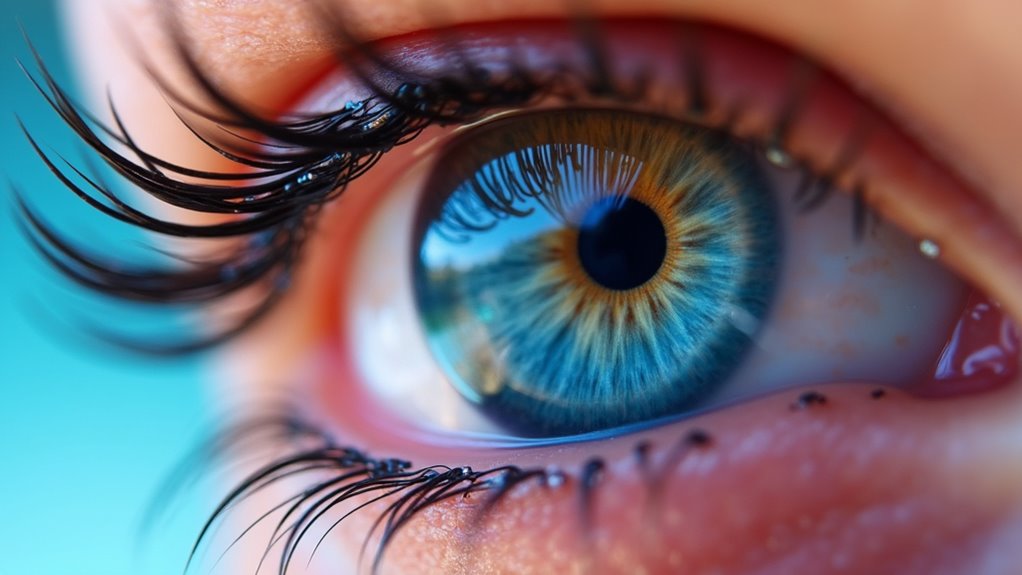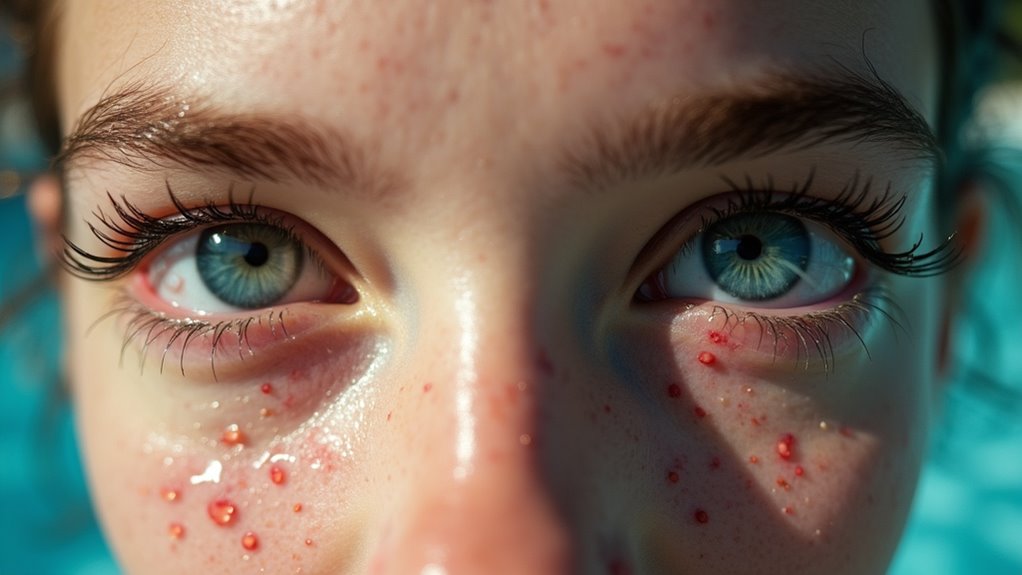Your burning eyes aren’t actually caused by chlorine but by chemical compounds called chloramines. These form when chlorine reacts with organic matter like sweat, oils, and urine in pool water. While pure chlorine rarely causes irritation, these chloramines can trigger redness, burning, and blurred vision. Wearing goggles and showering before swimming helps reduce exposure. Understanding pool chemistry reveals surprising truths about preventing swimmer’s eye discomfort.
Key Takeaways
- Chloramines, not pure chlorine, cause eye burning when chlorine reacts with sweat, urine, and body oils in pool water.
- Poor chemical balance in pools, especially incorrect pH levels outside 7.2-7.8, leads to eye irritation and burning sensations.
- Heavy pool usage increases chloramine formation as more swimmers introduce organic compounds through sweat and cosmetics.
- Not showering before swimming contributes to eye irritation by adding more nitrogen compounds that form irritating chloramines.
- Red, burning eyes indicate chemical imbalances in the pool water and not necessarily excessive chlorine levels.
The Science Behind Pool Water Chemistry

When chlorine interacts with organic compounds in pool water, it forms chemical byproducts called chloramines. These irritating compounds result from chlorine’s reaction with sweat, urine, body oils, and other contaminants introduced by swimmers. You’ll experience eye irritation when the pool’s chemical balance isn’t properly maintained.
Pool pH plays an essential role in your comfort and safety. The ideal pH range of 7.2 to 7.8 closely matches your eyes’ natural pH level. When pH levels fall outside this range, you’ll feel a burning sensation. Furthermore, water hardness affects how effectively the sanitizing chemicals work. High calcium levels can lead to scale formation and cloudy water, while low levels make the water more corrosive. Understanding these chemical interactions helps explain why your eyes might burn even in a properly chlorinated pool.
Debunking the Chlorine Myth

Three common misconceptions surround chlorine’s role in causing burning eyes. You’ll find that chloramines, not chlorine itself, typically cause irritation. When chlorine combines with organic materials like sweat, oils, and urine, it forms these irritating compounds.
| Myth | Reality | Scientific Explanation |
|---|---|---|
| Pure chlorine burns eyes | False | Pure chlorine rarely causes irritation |
| More chlorine means more burning | False | Higher chlorine levels reduce irritants |
| Chlorine alternatives prevent burning | Partially true | Some alternatives still form compounds |
| Red eyes indicate excess chlorine | False | Indicates poor chemical balance |
| Salt systems eliminate burning | False | Still produces chlorine through electrolysis |
When debunking myths about pool chemistry, it’s essential to understand that proper maintenance and balanced chemistry prevent eye irritation, regardless of the sanitizing system used.
Understanding Chloramines Formation

The formation of chloramines occurs through a specific chemical reaction between free chlorine and nitrogen-containing compounds in pool water. These nitrogen compounds come from your sweat, urine, cosmetics, and other organic materials you introduce into the pool. When free chlorine molecules interact with these contaminants, they create chloramines – chemical compounds that cause eye irritation.
You’ll notice that chloramine formation intensifies when pools are heavily used or poorly maintained. As more swimmers enter the pool, they bring further nitrogen-containing substances, accelerating the chemical reaction. The resulting chloramines not only irritate your eyes but also create that distinctive “pool smell” you’ve likely noticed. To minimize chloramine formation and reduce eye irritation, you should shower before swimming and never urinate in the pool.
Common Pool Contaminants and Eye Irritation
Beyond chloramines, numerous contaminants in swimming pools can cause eye irritation and discomfort. You’ll frequently encounter debris like skin cells, cosmetics, sunscreen, and body oils that interact with pool chemicals, creating irritating compounds. These substances can notably alter the pool pH, leading to eye inflammation.
Chemical imbalance in pools often results from improper maintenance or heavy bather load. When pH levels deviate from the ideal range of 7.2-7.8, you’re more likely to experience burning sensations, as this range closely matches your eyes’ natural tear pH. Furthermore, you may encounter microorganisms, including bacteria and algae, which thrive in poorly maintained pools. These pathogens can release toxins and organic compounds that further contribute to eye irritation, particularly when combined with existing chemical treatments.
Health Impacts of Pool Chemical Exposure
Swimming pool chemical exposure can affect multiple body systems beyond just ocular irritation. When you’re exposed to pool chemicals, you’ll notice both immediate and potential long-term health effects that require attention.
| System | Symptoms | Safety Measures |
|---|---|---|
| Eyes | Redness, burning, blurred vision | Wear goggles |
| Respiratory | Coughing, wheezing, throat irritation | Avoid inhaling fumes |
| Skin | Rashes, dryness, itching | Shower before/after |
| Digestive | Nausea if water ingested | Don’t swallow water |
| Neurological | Headaches, dizziness | Guarantee proper ventilation |
You’ll experience most eye irritation causes from chloramines, which form when chlorine combines with organic matter. To maintain pool chemical safety, guarantee proper chemical balance, ventilation, and always follow posted safety guidelines. If symptoms persist or worsen, you should seek immediate medical attention.
Prevention Tips for Swimmers
While proper pool maintenance is essential, swimmers can take several proactive steps to protect their eyes from chemical irritation.
Wearing well-fitted swimming goggles creates a protective barrier between your eyes and pool chemicals. Select goggles with proper suction and adjustable straps to prevent water seepage. Before entering the pool, rinse your goggles with clean water to remove any debris or residual chemicals.
Maintaining proper hydration plays a significant role in eye protection. Drink plenty of water before and after swimming to help your eyes produce adequate protective tears. When you exit the pool, immediately rinse your eyes with clean, fresh water for at least 30 seconds. This helps remove residual chlorine and other irritants that may have accumulated during your swim session.
Avoid rubbing your eyes while swimming or immediately afterward, as this can increase irritation and potentially introduce more chemicals to the eye surface.
Proper Pool Maintenance for Clear Eyes
Maintaining proper chemical balance in swimming pools directly affects eye comfort and safety for swimmers. You’ll need to monitor pH levels between 7.2-7.8 and verify proper chlorination at 1-3 ppm. Regular pool cleaning and water filtration are essential to prevent eye irritation.
| Chemical Parameter | Impact on Eyes |
|---|---|
| High pH (>7.8) | Severe burning, redness |
| Low pH (<7.2) | Stinging, inflammation |
| Imbalanced chlorine | Corneal irritation |
Your weekly maintenance should include testing water chemistry, backwashing filters, and removing debris. Don’t forget to check the pool’s filtration system daily for peak performance. When these parameters aren’t maintained, swimmers often experience red, burning eyes from chemical imbalances. Professional pool services can help establish proper maintenance schedules to protect swimmers’ eye health.
When to Seek Medical Attention
When should you seek medical help for pool-related eye irritation? While most swimming-related eye discomfort resolves within 24 hours, certain eye symptoms warrant immediate medical attention. Contact your healthcare provider if you experience persistent redness, blurred vision, or severe pain that lasts more than a day after swimming.
Seek emergency medical advice if you develop sensitivity to light, discharge from the eyes, or decreased vision. These symptoms may indicate a serious condition like chemical keratitis or corneal damage. Don’t delay treatment if you notice swelling around the eyes, feel like there’s something trapped in your eye, or experience changes in your visual field. Early intervention can prevent potential complications and permanent damage. If you wear contact lenses and develop any unusual eye symptoms after swimming, remove them immediately and consult an eye care professional.
Frequently Asked Questions
Can Wearing Contact Lenses While Swimming Make Eye Irritation Worse?
Yes, wearing contact lenses while swimming greatly increases your risk of eye irritation and infection. Your contacts can trap harmful pool chemicals and bacteria against your eye surface, potentially leading to serious complications. For proper contact lens care and eye protection, you’ll want to remove your lenses before swimming or wear watertight goggles over them. If you must wear contacts while swimming, use daily disposables and discard them immediately afterward.
How Long Does Pool-Induced Eye Irritation Typically Last?
Pool-induced eye irritation duration typically ranges from 30 minutes to several hours, depending on multiple swimming pool factors. You’ll notice the discomfort subsiding gradually once you’ve left the pool environment. If you’ve been exposed to high chlorine levels or imbalanced pH, symptoms might persist longer. In most cases, you’ll experience complete relief within 24 hours. However, if irritation lasts beyond this timeframe, you should consult an eye care professional.
Are Some People Naturally More Sensitive to Pool Chemicals Than Others?
Yes, you’ll find significant variations in individual sensitivity to pool chemicals. Your genetic makeup, pre-existing conditions, and general eye health can influence your reaction to chemical exposure. If you have allergies, sensitive skin, or dry eyes, you’re more likely to experience heightened discomfort. Furthermore, your previous exposure history and frequency of pool use can affect how your body responds to common pool sanitizers like chlorine and bromine compounds.
Do Indoor Pools Cause More Eye Irritation Than Outdoor Pools?
Yes, you’re likely to experience more eye irritation in indoor pools compared to outdoor ones. Indoor humidity causes pool chemicals to become trapped and concentrated in the air above the water’s surface, leading to higher chemical concentration levels. When these concentrated chemicals interact with your eyes, they can cause increased irritation. Furthermore, indoor pools often require more sanitizing chemicals due to their enclosed environment, further contributing to potential eye discomfort.
Can Using Swim Goggles Completely Prevent Eye Irritation From Pool Water?
While swim goggles offer significant protection against pool water irritants, they can’t guarantee 100% effectiveness in preventing eye irritation. Even well-fitted goggles may occasionally leak or allow small amounts of water to seep in around the edges. For ideal swimming safety and goggle effectiveness, you’ll want to make sure proper fit, maintain your goggles regularly, and replace them when seals begin to deteriorate. Consider using anti-fog goggles with silicone seals for best results.



